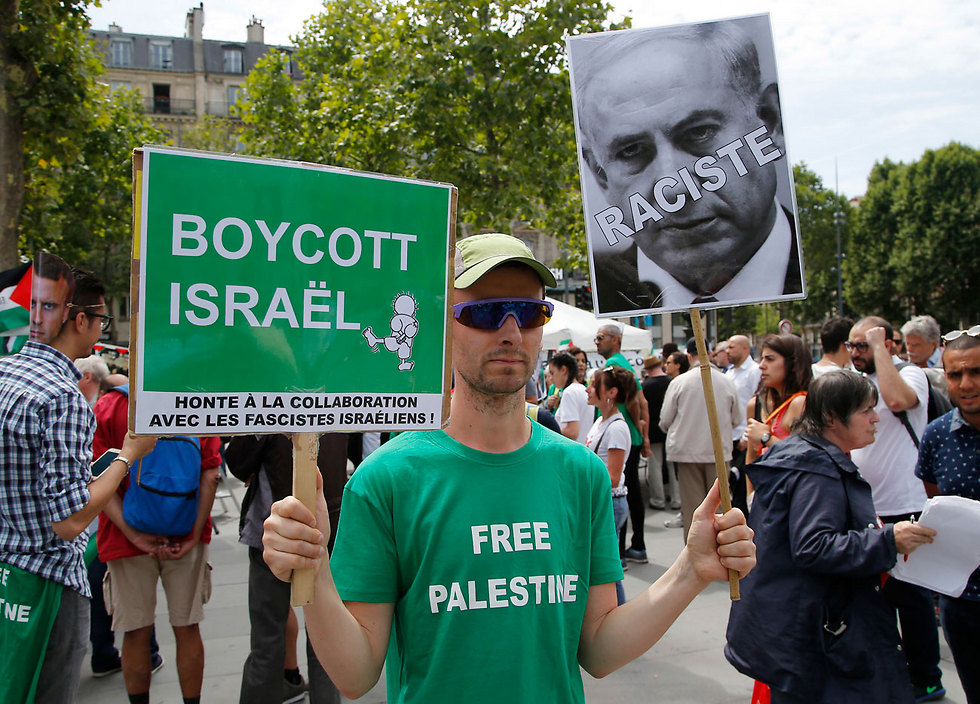

Israel's exilic existential anxiety
Op-ed: Israel's founding fathers hoped that when we have our own country, where we can defend ourselves by ourselves, the existential anxiety that had characterized us over 2,000 years of exile would disappear. But it hasn't. Our hysterical treatment of BDS supporters is not strategic in nature, it's psychological.
Israeli society is living in internal contradiction. On the one hand, we champion the "we don't care what others think about us" attitude. Supposedly, as Ben-Gurion declared, "it's not important what the gentiles say, it's important what the Jews do."
The new Jew neglected his outward appearance, dismissed manners in the name of the sacred Hebrew "dugri" (direct speech) attitude, and carried out retaliatory actions that drew criticism in the world. Any attention to what others think—on the way we dress, speak or run our country—is seen as exilic, as an offensive symptom of that hyper-sensitivity to the gentiles. The exilic Jew didn't want to cause antagonism, he wanted to be invited to dinner by the neighbors, he was willing to adapt to the expectations of the non-Jewish crowd. The new Jew doesn't need this. He's home, and at home he's doing whatever he wants, and damn the neighbors.
On the other hand, the new Jew is hyper-sensitive to what others say about him. He would've liked—after the first moments of shock—the neighbors to love him, appreciate him, follow his example. He wants to be a "Light unto the Nations."
This theoretical yearning is connected to something deeper than anxiety over one's image. Armed from head to toe, protected by nuclear warheads (according to foreign reports), no longer a servant with no rights, but an over privileged master who has his own "Jews"—the new Jew has yet to complete the mental recovery that Israel's founding fathers wished for. After we returned to our land and established a sovereign state in it, they hoped, after we once again became accustomed to being able to defend ourselves by ourselves, the existential anxiety that characterized us over the course of "2,000 years in exile" would disappear. The new Jew will get rid of the nightmares of the old Jew, of the terror that was always hovering over our very existence. Without this anxiety, which made the Jew constantly vigilant so he could prepare himself in advance for the blow to come, we would finally be "like all other nations."
What does it mean to be "like all other nations"? That's a good question. It appears it's not about becoming similar to them in customs or faith; the State of Israel was established so we could be different without fear. Being "like all other nations" means not to act out of the existential need to please, but also not out of complete disregard to the world. To stop viewing everything in the terms of "what will they say about us," but also not give ourselves a general indulgence (a pardon) because of our chosenness or past suffering. To listen to criticism without having to accept it right away, but at the same time not automatically define it as anti-Semitic. To examine our actions and the actions of our friends in their own right, based on the principles of universal justice: whether—in the terms of philosopher Immanuel Kant—we'd be willing to make our actions the norm. Meaning, are we willing to be treated in the same way we've treated others?
This process hasn't happened. Under the Netanyahu governments, the exilic existential anxiety has become the main characteristic of the Israeli. And if there's no existential threat, there's no choice but to make one up.
The most typical example of the Israeli anomaly is the hysterics over the BDS Movement. This movement, which calls for boycott—full or partial—of Israel, represents the margins of the margins. Most of the world's governments have friendly relations with Israel. So what is the problem? In some of the universities in the West, there are BDS groups that get little support from their institutions.
When you inquire about the achievements of the BDS movements, you are presented with a list of entertainers who refused to perform in Israel. The exalters of BDS also mention several academics who refused to come to Israel and even—may the all-merciful protect us—won't write letters of recommendation. How many of them? Let me tell you that in my three years as the head of the History Department at Tel Aviv University, hundreds of guests visited us. How many refusals did we receive, in a field that is supposedly a breeding ground for bleeding heart liberals? You can count them on one hand.
How did the BDS Movement become an existential threat that justifies unfounded conduct, like in the case of Lara Alqasem? The answer will not be found in the field of strategy, but in psychology.
















